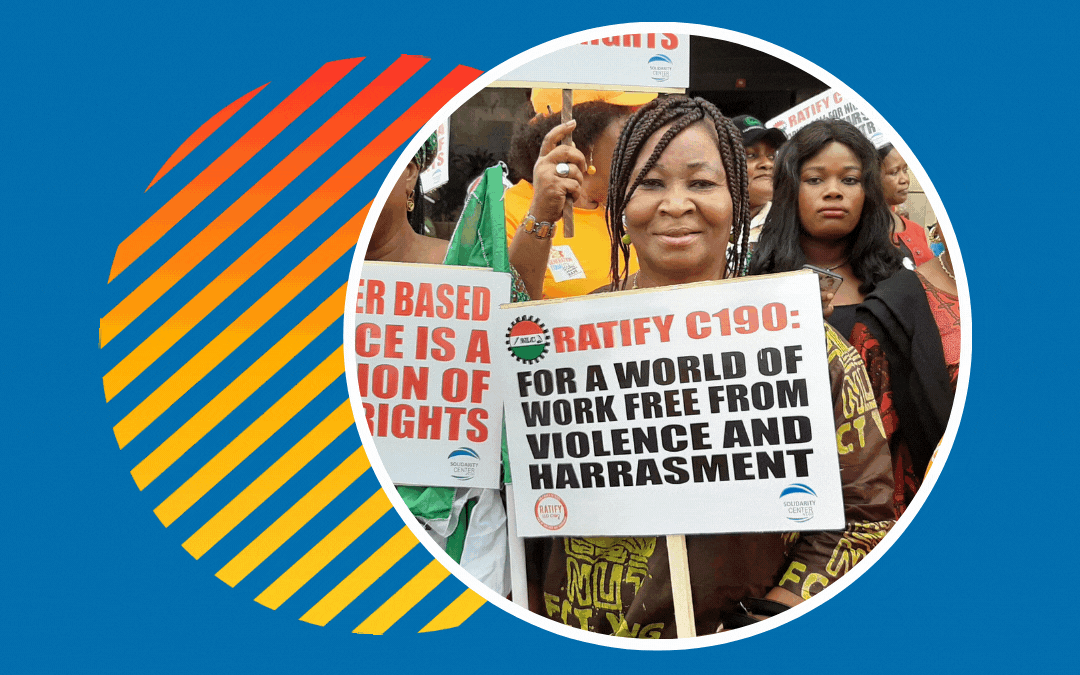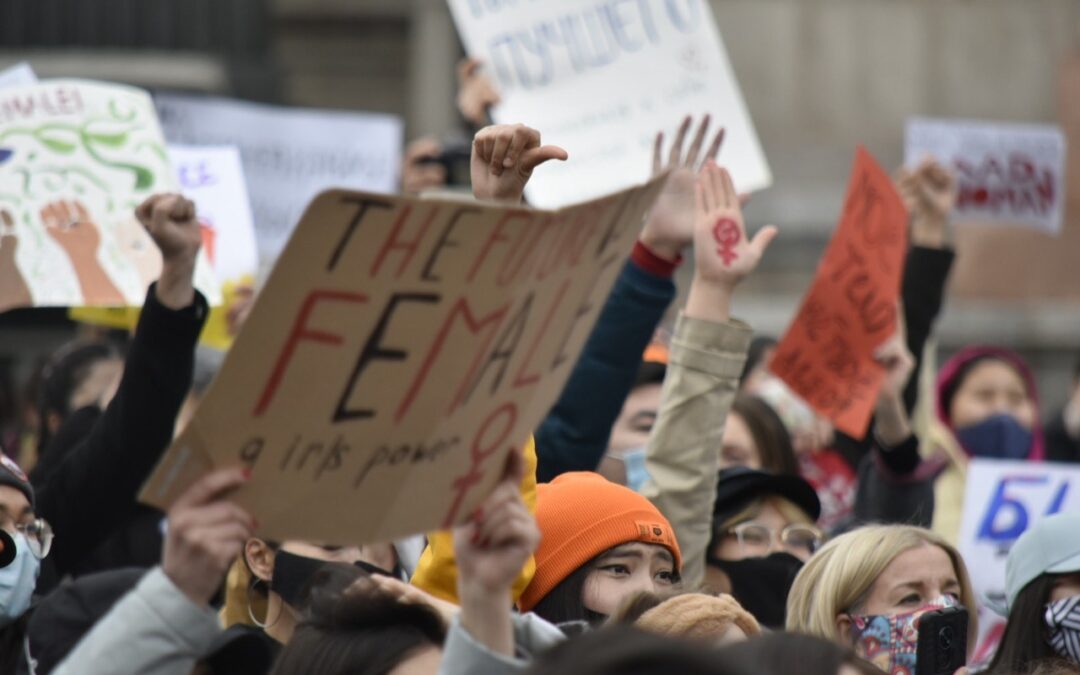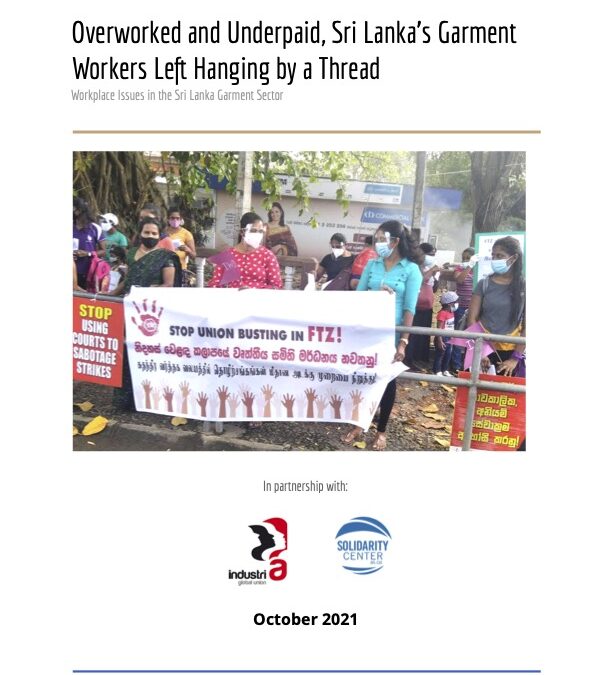
Nov 17, 2021
Union women are not waiting for their governments to ratify Convention 190, the international treaty that addresses gender-based violence and harassment in the world of work—they are taking action now to ensure workers benefit from the powerful rights it provides, according to Rita Goyit, speaking on this week’s Solidarity Center Podcast.
“We are taking concrete measures while we wait for the ratification,” says Goyit, head of the Nigeria Labor Congress (NLC) Department of Women and Youth and secretary of the NLC’s National Women Commission.
With support of the NLC and Solidarity Center, union activists conducted an informal survey of more than 900 women workers in Abuja and Lagos and found 57 percent had experienced GBVH at work, yet 20 percent did not report it for fear of employer retaliation.
“What was common about the story is that sexual harassment, gender-based violence exists in the workplace,” Goyit tells Solidarity Center Executive Director and podcast host Shawna Bader-Blau. “And it was not treated as a workplace issue.”
Through outreach and training, Nigerian unions are reaching workplaces as diverse as garment factory floors and sprawling informal markets, where workers put in place what works for them, like anonymous suggestion boxes to report harassment.
Goyit says union women are developing strategies that “will really address gender-based violence in the workplace because this is a worker-specific issue, it’s coming from with the workers ourselves.
“We’re putting our heads together until we find the solution … because the women are with us. Because I feel strong when I see the other women around me in our campaigns, in the negotiations that we do.”
More from The Solidarity Center Podcast!
Listen to this and all Solidarity Center episodes here or at Spotify, Amazon, Stitcher, Castbox or wherever you subscribe to your favorite podcasts.
Download recent Season Two episodes:
The Solidarity Center Podcast, “Billions of Us, One Just Future,” highlights conversations with workers (and other smart people) worldwide shaping the workplace for the better.

Nov 15, 2021
The Free Trade Zones and General Services Employees Union (FTZ & GSEU) has become the first union to successfully bargain a collective agreement with a factory in Sri Lanka’s largest free trade zone.
The collective agreement was signed between the union and the factory, Next Manufacturing Limited, on October 22, 2021, less than a year after a trade union branch office of the FTZ & GSEU was set up at the factory.
Speaking on the achievement, Joint Secretary of the Union Anton Marcus, says factory employees joined the union in December 2020, when they launched a strike to demand payment of late bonuses. “We eventually signed a two-year collective agreement with the company with the support of trade unions and civil society organizations in the United Kingdom.”
The agreement is a first for the Katunayake Investment Promotion Zone. Prior to this, only one other factory chain–the Esquel Group, with more than 350 garment factories–had entered into a collective agreement in Sri Lanka. Both agreements were negotiated and signed with the FTZ & GSEU Union.
“Under this collective agreement, we have agreed to discuss not only the terms and conditions that affect employees but also all privileges and demands submitted by the unions from time to time, and training and development programs that workers can enroll in,” says Marcus. “They also agreed to deduct salary dues and credit the union’s account, and to allow a two-hour duty leave per month to hold committee meetings within factory premises and a half-day duty leave to hold general meetings. The union has agreed to provide two noticeboards, a cabinet and a telephone for the two branch buildings, and the first members are allowed to assemble in the workplace if required, either after work or before the commencement of work.”
This landmark victory carries an important message to all those who work in the garment industry. Collective bargaining power and worker rights can be won even in the garment sector.
The FTZ & GSEU are partners of the Solidarity Center.

Nov 12, 2021
In a win for gender and pay equity in the former Soviet region of Kazakhstan, last month the country abolished a list of jobs from which women have been legally barred since 1932. Such discriminatory lists—which force women away from higher-paid work in traditionally male-dominated sectors toward lower-paid, female-dominated occupations—are common in the region, including in Belarus, Kyrgyzstan, Russia and Uzbekistan.
Abolition of Kazakhstan’s list came about after years of advocacy efforts by Solidarity Center partner Kazakhstan International Bureau for Human Rights (KIBHR) in meetings, conferences and other fora with policy makers and government representatives, including the Ministry of Labor and Social Protection of the Republic of Kazakhstan, and the Commission on Human Rights under the President of the Republic of Kazakhstan.
“In the modern world there should not be discriminatory restrictions on access to work and all people themselves have the right to choose where and how to work,” said KIBHR Deputy Director Denis Jivaga.
Among the jobs previously denied to women were relatively well-paid jobs in construction, metalwork, mining and oil extraction sectors including: jobs performed at-height or underground; skilled construction, road and metal-working jobs including masonry, ground-moving machine operation, ore smelting, pipe fitting and welding; and specialized work in exploration and surveying such as borehole drilling, derrick installation and pipe pressing.
The International Labor Organization (ILO) has long called on states to abolish lists of professions prohibited for women given their discriminatory impact. Women in Kazakhstan, for example, earn 32 percent less than men on average.
Kazakhstan’s list—which restricted women from more than 200 jobs on the grounds that the work was too physically demanding or dangerous—was abolished after the Kazakhstan government acknowledged to the UN Committee on the Elimination of Discrimination Against Women (CEDAW) that job prohibitions have contributed to gender-pay inequity. The UN Committee on Economic, Social and Cultural Rights (CESR) recommended that Kazakhstan consider other forms of legal protection for women to keep them safe at work rather than a total ban on access to certain professions.
“Gender and pay equity require that men and women have equal access to all types of work, and that all jobs be made safe for all workers,” says Solidarity Center Europe and Central Asia Regional Program Director Rudy Porter.
Read in Russian.

Nov 10, 2021
A survey of garment workers in Sri Lanka, conducted in partnership with Solidarity Center and IndustriALL, found employer opposition and harassment has limited their ability to form unions and address workplace rights violations such as increased workloads and work hours, layoffs and temporary termination.
Download here.

Nov 10, 2021
The Fight for $15 movement in the United States, in which workers seek a living wage and a union, is part of a global struggle by fast food workers often employed by the same multinational corporations that make massive profits even as their employees struggle to get by.
In Thailand, Apantree Charoensak, a former union leader who led the campaign to organize fast food workers at KFC, describes on this week’s Solidarity Center Podcast how workers overcame the company’s opposition to successfully form a union and win better wages and working conditions.
“The company knew that if the demands were successful, it would impact 70 percent of the workers which, back then, there were about 18,000 workers. So they pressured and threatened me a lot,” she tells podcast host and Solidarity Center Executive Director Shawna Bader-Blau. “They said they would get me out of the company, if I still tried to help other workers.”
Charoensak says the campaign drew lessons from the U.S. Fight for $15 campaign throughout the years-long effort to form a union.
“It took six years from [when] the union was first organized until we reached the threshold of 20 percent because in Thailand, the law requires that you have to reach over 20 percent of all the workforce before you can file for collective bargaining.”
Catch All Solidarity Center Podcasts!
Listen to this all Solidarity Center episodes here or at Spotify, Amazon, Stitcher, Castbox or wherever you subscribe to your favorite podcasts.
Download recent Season Two episodes:
The Solidarity Center Podcast, “Billions of Us, One Just Future,” highlights conversations with workers (and other smart people) worldwide shaping the workplace for the better.

Nov 3, 2021
Police violence, which escalated during COVID-19, is part of a rising tide of global crackdowns targeting marginalized communities, workers and young people struggling to support themselves. The latest episode of The Solidarity Center Podcast looks at how workers in Colombia and Nigeria—targeted by police brutality as they staged peaceful protests to address inequality—are joining and leading large movements to demand new levels of accountability from and reform of the authorities charged with protecting and serving their communities.
Podcast host and Solidarity Center Executive Director Shawna Bader-Blau talks with Francisco Maltés, president of the Unitary Workers Center (CUT) in Colombia, and Gbenga, general secretary and founder of the Federation of Informal Workers’ Organizations of Nigeria. They describe how workers, especially those living most on the edge, are taking back their communities by standing up for justice and opposing decades of widespread, systemic corruption that feeds off state-sponsored violence.
“Justice and police activity in Colombia can be characterized as being directed at poor people,” says Maltés. “The National Strike Committee has proposed a bill for reforming the national police force.”
Catch More from Season Two!
Listen to this and all Solidarity Center episodes here or at Spotify, Amazon, Stitcher, Castbox or wherever you subscribe to your favorite podcasts.
Catch recent Season Two episodes:
The Solidarity Center Podcast, “Billions of Us, One Just Future,” highlights conversations with workers (and other smart people) worldwide shaping the workplace for the better.






